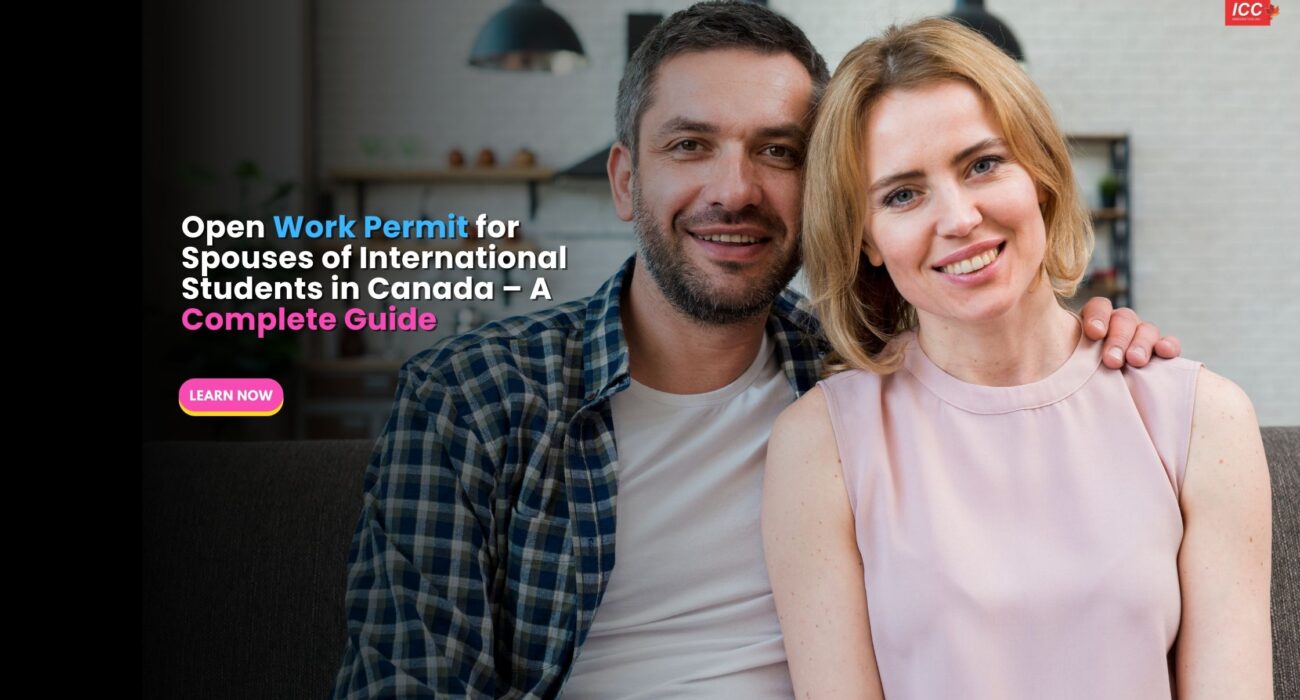Canada remains one of the world’s most popular destinations for international education. With over half a million students enrolled each year, many bring their families along — and spouses or common-law partners of these students may qualify for an Open Work Permit (OWP). This permit allows them to work in Canada for almost any employer while their partner studies, offering financial stability and valuable Canadian work experience.
If you’re wondering who can get an open work permit as the spouse of an international student in Canada, this guide will walk you through eligibility, application steps, and how ICC Immigration can support your journey.
What Is an Open Work Permit (OWP)?
An open work permit is a work authorization that is not tied to a specific employer or job. Unlike an employer-specific work permit, it gives you the flexibility to work in most industries across Canada. For spouses of international students, the permit is generally issued with a validity period up to the expiry of the student’s study permit.
Key SEO keywords: Open Work Permit Canada, spouse of international student, Canada work visa for spouse.
Who Can Apply: Spouses and Common-Law Partners
You may be eligible for an open work permit as a spouse or common-law partner if your partner is enrolled full-time at a Designated Learning Institution (DLI) in an eligible program. You count as a spouse as soon as you’ve been legally married anywhere in the world. If not legally married, you can qualify as a common-law partner if you’ve lived together in a conjugal relationship for at least 12 months (with minimal time apart).
Eligible Programs
Spouses of international students may qualify for an open work permit if the student is enrolled in:
-
Doctoral programs
-
Master’s programs of at least 16 months
-
Eligible professional degrees including:
-
Doctor of Dental Surgery (DDS, DMD)
-
Bachelor of Law or Juris Doctor (LLB, JD, BCL)
-
Doctor of Medicine (MD)
-
Doctor of Optometry (OD)
-
Pharmacy degrees (PharmD, BS, BSc, BPharm)
-
Doctor of Veterinary Medicine (DVM)
-
Bachelor of Science in Nursing (BScN, BSN)
-
Bachelor of Nursing Science (BNSc, BN)
-
Bachelor of Education (BEd)
-
Bachelor of Engineering (BEng, BE, BASc)
-
In addition, several pilot programs also make spouses eligible for an open work permit if the application is filed after the relevant eligibility period begins. Examples include programs for internationally educated nurses, midwives, medical technologists, and pharmacists in provinces like Quebec, Ontario, Manitoba, and British Columbia.
Key SEO keywords: spousal open work permit Canada, eligibility for open work permit spouse, Canada immigration spouse visa.
Validity and Extensions
A spousal open work permit cannot be issued for longer than the student’s study permit. If the student is in their final semester, extensions are usually not possible. To extend an existing OWP, the student must:
-
Hold a valid study permit
-
Be physically present in Canada
-
Be enrolled full-time in a Post-Graduation Work Permit (PGWP)-eligible program
-
Not be in their final academic term
Tip: Apply early to avoid interruptions in your work authorization.
How to Apply for a Spousal Open Work Permit
-
Review IRCC Instructions – Read the official guide to understand the forms and documents required.
-
Gather Documentation – Proof of full-time enrollment at a DLI (enrollment letter or transcripts), copy of the student’s study permit, marriage certificate or proof of common-law partnership.
-
Create an IRCC Account – Apply online through the official IRCC portal.
-
Pay the Fees – Submit the open work permit and biometrics fees as applicable.
-
Submit Application – Double-check your forms and documents to avoid delays.
Key SEO keywords: apply for spousal open work permit Canada, documents for open work permit spouse.
Why Getting Professional Help Matters
Even though the process may seem straightforward, incomplete or incorrect applications often lead to delays or refusals. Having a licensed immigration consultant review your application can save you months of waiting and the risk of rejection.
How ICC Immigration Can Help You Secure Your Future in Canada
ICC Immigration is dedicated to helping individuals and families achieve their Canadian immigration goals. Our experienced team provides personalized guidance, ensuring that your application is complete and compliant with current regulations.
Here’s how we support you:
-
Permanent Residency Applications: Whether through Express Entry, Provincial Nominee Programs (PNPs), or other pathways, we ensure your PR application runs smoothly.
-
Work Permits and Study Permits: We help you explore temporary options such as work and study permits that can lead to permanent residency.
-
Family Sponsorships: If you have family members in Canada, we assist with family reunification applications, including spousal and parental sponsorship.
-
Expert Legal Advice: Our consultants help you understand Canadian immigration rules, reducing your risk of refusal.
Instead of relying on uncertain or risky immigration routes, ICC Immigration can help you build a stable path toward permanent residency in Canada.
Why Choose ICC Immigration for Your Spousal Open Work Permit
-
Licensed Experts: Our RCIC-licensed consultants understand the nuances of Canadian immigration law.
-
Tailored Strategy: We assess your situation and advise on the best course of action.
-
Proactive Communication: We guide you from start to finish, keeping you updated on your application.
-
Faster Processing: By ensuring your file is complete and accurate, we help avoid unnecessary delays.
Take Control of Your Canadian Future Today
If you’re the spouse or common-law partner of an international student, you may be eligible for an open work permit that lets you work in Canada while your partner studies. This not only improves your family’s financial stability but also boosts your own Canadian work experience — a key factor when applying for permanent residency later.
Let ICC Immigration’s experienced team help you navigate your open work permit application, avoid costly mistakes, and build a clear pathway to permanent residency in Canada.




